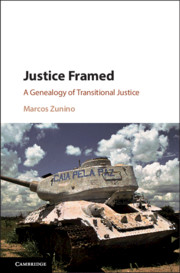(Source: CUP)
Cambridge
University Press has published a book dealing with the history of
transitional justice.
ABOUT THE BOOK
Why are certain
responses to past human rights violations considered instances of transitional
justice while others are disregarded? This study interrogates the history of
the discourse and practice of the field to answer that question. Zunino argues
that a number of characteristics inherited as transitional justice emerged as a
discourse in the 1980s and 1990s have shaped which practices of the present and
the past are now regarded as valid responses to past human rights violations.
He traces these influential characteristics from Argentina's transition to
democracy in 1983, the end of communism in Eastern Europe, the development of
international criminal justice, and the South African truth commission of 1995.
Through an analysis of the post-World War II period, the decolonisation process
and the Cold War, Zunino identifies a series of episodes and mechanisms omitted
from the history of transitional justice because they did not conform to its
accepted characteristics.
ABOUT THE AUTHOR
Marcos
Zunino, British Institute of International and Comparative Law
TABLE OF
CONTENTS
1. Introduction
Part I. History:
2. The discourse
of transitional justice: objects, concepts, actors and characteristics
3. The birth of
transitional justice: emergence
Part II.
Prehistory:
4. The myth of
Nuremberg: origin
5. The Cold War
impasse: descent
6. Conclusion
Bibliography
Index.
More information
here


No comments:
Post a Comment
Note: Only a member of this blog may post a comment.